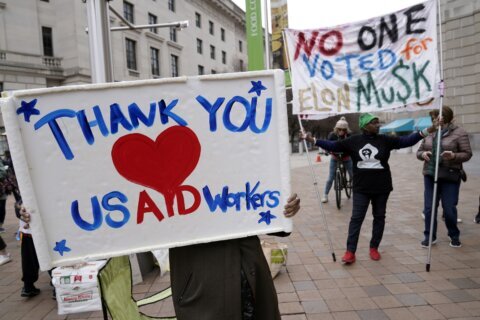Hiring efforts focused on diversity, equity and inclusion, or DEI, aim to foster safer and more inclusive workplaces that embrace greater diversity among employees. But recently, these initiatives have faced growing opposition from the Trump administration and corporate leaders, and resistance is afoot in some workplaces.
In July 2024, the Society for Human Resource Management, the country’s largest HR association, dropped “equity” in DEI from its terminology, saying that companies are taking “a step back” from their DEI initiatives amid societal backlash.
And on Jan. 21, President Donald Trump issued an executive order to eliminate DEI policies and programs throughout the federal government and within companies that do business with the federal government.
What Does DEI Mean in the Workplace?
DEI policies support people from different backgrounds and give them the resources they need to thrive in the workplace. These policies were created because marginalized communities have struggled to get equal opportunities in job environments that have historically lacked diversity.
When a company implements DEI hiring practices, it recruits employees of different races, cultural backgrounds, genders and sexual orientations to give underrepresented groups equal access to job opportunities. Doing so reduces the impact of unconscious bias and could also improve workplace performance.
DEI enhances company performance as well. According to research from management consultant firm McKinsey & Co, companies in the top quartile for ethnic diversity on executive teams are 39% more likely to outperform those in the bottom quartile.
[See: 25 Best Jobs That Pay $100K.]
What Is Behind the Anti-DEI Hiring Trend?
DEI hiring was designed to create opportunities for people who typically don’t have them. Despite an intent to promote fairness and inclusivity, these efforts have faced criticism.
The backlash against DEI hiring seems to stem from a mix of misunderstanding, missteps and perceived unfairness. Some critics believe DEI policies are lowering the bar for hiring and promotions, and others complain that DEI initiatives lack structure and follow-through. There’s also a perception among some majority-group employees that these initiatives have left them out or cost them opportunities.
For example, in January 2024, Elon Musk criticized the idea of DEI on his social media platform X, suggesting it was “just another word for racism,” while others mocked the concept, suggesting DEI stands for “didn’t earn it.” Musk and other anti-DEI leaders are embracing a shift toward “merit, excellence and intelligence,” or MEI, which prioritizes individual merit and contributions without considering demographic factors.
DEI efforts have increasingly come under fire since the U.S. Supreme Court banned affirmative action in college admissions in June 2023. Since then, some states throughout the country, including Texas, North Carolina and North Dakota, have passed legislation banning the inclusion of DEI efforts in higher education. For example, in March 2024, the University of Florida closed the Office of the Chief Diversity Officer and eliminated DEI positions and administrative appointments for faculty.
Anti-DEI sentiment has also spread to the corporate world. In July 2023, 13 Republican attorneys general sent a letter urging Microsoft and other Fortune 100 companies to reexamine their DEI policies in response to the Supreme Court’s affirmative action ruling. Additionally, major corporations including Meta, Tesla, DoorDash, Lyft, Home Depot and Wayfair have cut staff, slashing the size of their DEI departments. Mentions of DEI on corporate earnings calls have also plummeted in the past couple of years, according to financial research firm AlphaSense.
[See: 20 Careers With the Most Job Security Right Now.]
How Trump Is Fueling Backlash Against DEI
Immediately after his inauguration this January, Trump began issuing executive orders to restore merit-based hiring throughout the federal government. He also signed an executive order eliminating “radical and wasteful” DEI programs.
Following Trump’s lead, major companies including Walmart, Target, McDonald’s, Google, Lowe’s and Meta announced they would scale back their commitments to diversity.
“From my perspective, the shift away from DEI initiatives under the Trump administration isn’t just a legal or policy matter — it’s fundamentally reshaping how organizations define talent, inclusion and workplace engagement,” said Etty Burk, an organizational psychologist and founder of Leading with Difference, in an email.
“Some companies are rolling back DEI programs due to legal concerns or political pressures, while others are quietly integrating DEI principles and rebranding them under different labels, such as belonging or inclusive leadership,” she said.
What Employees Should Know About Anti-DEI Hiring
Employees should know that while public-facing diversity efforts may appear to be fading, many companies are still prioritizing DEI — just under different names to avoid unwanted lawsuits or scrutiny.
“Most companies we work with (many who operate across the globe) are maintaining DEI efforts, although they might be calling them something different,” said Laurie Cure, founder and CEO of Innovative Connections, a consulting firm providing organizational effectiveness solutions, in an email. And according to the Heritage Foundation, nearly all Fortune 500 companies still list commitments to the DEI ideology on their websites.
That said, there’s growing fear around anything explicitly labeled “DEI.” Some companies are scrubbing the language from hiring documents, performance evaluations and leadership development programs to avoid political or legal backlash.
Still, Cure believes that many organizations will remain committed to the intent behind DEI and will work hard to uphold inclusive practices and do so within the rapidly changing legal framework.
[Workers Weigh in on What Makes a Great Company to Work For]
What Employers Need to Decide Amid the DEI Backlash
As the legal and political climate shifts, employers will have to face tough decisions about the future of DEI in their organizations.
“I don’t expect companies to be uniform in making these decisions,” said Robert Papandrea, labor and employment attorney at Morgan, Brown & Joy, in an email. “I believe these changes, to an extent, are going to require many companies to re-examine their identities and how important diversity is to them.”
According to Papandrea, employers have a few paths forward:
1. Make the easy and risk-averse choice to do away with any DEI measures
2. Defend the methods of promoting diversity that they believe are lawful
3. Modify policies they see as risky to attempt to achieve the same objectives in a less risky manner
What Lies Ahead for DEI Hiring Efforts?
The future of DEI hiring will likely depend on how companies define their values in this new political and legal climate.
“It’s reasonable to believe that if companies are going to end all efforts to promote a diverse workspace, it may negatively impact the number of employees from underrepresented communities that they attract and retain,” Papandrea said.
“However, I think it’s also reasonable to believe that if companies remain committed to principles of diversity and inclusion, and they decide to modify their DEI policies or defend them, they should be able to maintain a diverse workforce.”
In terms of the kinds of companies that may shift away from DEI initiatives, Papandrea thinks federal contractors will likely be the most risk-averse, whereas companies that are not federal contractors — and that view diversity as a core business value — may be more likely to stand behind their commitment to diversity.
It’s also important to note that despite the shift in tone under the Trump administration and dozens of organizations backing away from DEI goals, DEI hasn’t disappeared. Diversity and inclusion programs still exist in the workplace, but sometimes under different names.
More from U.S. News
13 Things Your Boss Can’t Legally Do
5 Workplace Trends That Employers Love and Workers Hate
3 Workplace Trends to Eye for 2025
What Is Anti-DEI Hiring? originally appeared on usnews.com
Update 03/28/25: This story was published at an earlier date and has been updated with new information.







